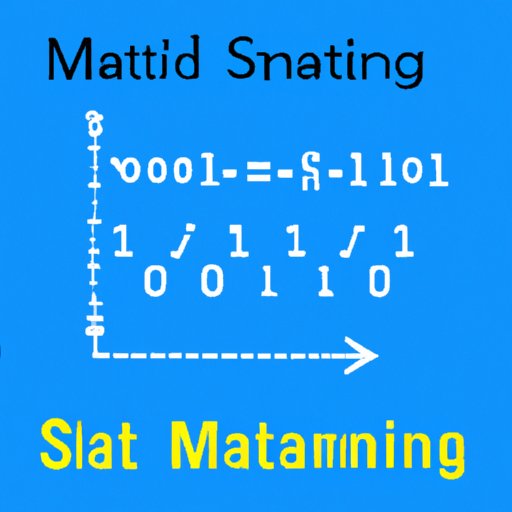Introduction
Data science is an interdisciplinary field that combines elements from statistics, computer science, and mathematics to analyze and interpret large datasets. As such, it requires a good understanding of mathematical concepts. But how much math is needed for data science? In this article, we’ll explore the role of mathematics in data science and the types of math used in the field. We’ll also examine the benefits of knowing math for data science.

Overview of Math Requirements for Data Science
Mathematics plays a critical role in data science; without it, data scientists would not be able to make sense of the vast amounts of data they work with on a daily basis. To be successful in data science, one needs to have a strong foundation in mathematics, including calculus, linear algebra, probability, and statistics. However, the amount of math required for data science depends on the type of job one is pursuing. For example, if you’re interested in becoming a machine learning engineer, you’ll need a more advanced understanding of mathematics compared to someone who wants to become a data analyst.

Understanding the Role of Mathematics in Data Science
Math is an essential part of data science because it helps to understand the underlying principles of data analysis. It also provides the tools necessary to process and interpret data. By using mathematics, data scientists can develop algorithms and models which can be used to identify patterns in data and make predictions about future outcomes. Furthermore, math allows data scientists to understand the relationships between different variables and develop strategies for solving complex problems.
Types of Math Used in Data Science
There are several types of mathematics used in data science. These include calculus, linear algebra, probability, and statistics. Calculus is used for numerical analysis and optimization, while linear algebra is used to solve linear equations and matrices. Probability theory is used for making predictions about random events, and statistics is used for analyzing data sets. Each of these mathematical concepts has its own unique applications in data science.
Exploring Different Mathematical Concepts
Calculus is used extensively in data science. It enables data scientists to calculate derivatives, integrals, and other numerical values. Calculus is used to optimize algorithms and models, as well as to predict the behavior of systems. Linear algebra is used to solve linear equations and matrices, which are essential for analyzing data sets. Probability theory is used to make predictions about random events, and statistics is used to analyze data sets and draw conclusions from them.
Examining the Impact of Mathematical Knowledge on Data Science
Having a solid understanding of mathematics is essential for data science. It enables data scientists to develop algorithms and models which can be used to identify patterns in data and make predictions about future outcomes. Mathematics also provides the tools necessary to process and interpret data, as well as to understand the relationships between different variables. Without mathematics, data scientists would not be able to make sense of the vast amounts of data they work with on a daily basis.
Benefits of Knowing Math for Data Science
Knowing math can provide many benefits for data science. For example, data scientists who have a strong understanding of mathematics will be able to create more accurate models and algorithms. They will also be better equipped to analyze data sets and draw meaningful insights from them. Moreover, having a good mathematical background will help data scientists identify patterns and trends in data, as well as develop strategies for solving complex problems.
Analyzing the Advantages of Having Mathematical Knowledge
Having a good mathematical background can help data scientists in many ways. For example, having a strong foundation in mathematics will enable them to create more accurate models and algorithms. Furthermore, data scientists who understand the fundamentals of mathematics will be better equipped to analyze data sets and draw meaningful insights from them. In addition, having a good understanding of math will allow data scientists to identify patterns and trends in data, as well as develop strategies for solving complex problems.

Demonstrating How Much Math is Needed for Data Science
The amount of math needed for data science depends on the type of job one is pursuing. Generally speaking, a good understanding of mathematics is essential for data science. This includes calculus, linear algebra, probability, and statistics. However, the level of mathematical knowledge required may differ depending on the type of position. For example, if you’re interested in becoming a machine learning engineer, you’ll need a more advanced understanding of mathematics compared to someone who wants to become a data analyst.
Conclusion
In conclusion, mathematics is an essential part of data science. It enables data scientists to create more accurate models and algorithms, as well as analyze data sets and draw meaningful insights from them. There are several types of mathematics used in data science, including calculus, linear algebra, probability, and statistics. The amount of math needed for data science depends on the type of job one is pursuing, but generally speaking, a good understanding of mathematics is essential for data science.

Summary of the Main Points
This article explored the role of mathematics in data science and the types of math used in the field. We examined the benefits of knowing math for data science, as well as the advantages of having a strong mathematical background. Finally, we discussed the amount of math needed for data science, which depends on the type of job one is pursuing.
Final Thoughts on Math and Data Science
To be successful in data science, one needs to have a strong foundation in mathematics. Math is an essential part of data science because it helps to understand the underlying principles of data analysis and provides the tools necessary to process and interpret data. Having a good understanding of math will enable data scientists to create more accurate models and algorithms, as well as analyze data sets and draw meaningful insights from them.
(Note: Is this article not meeting your expectations? Do you have knowledge or insights to share? Unlock new opportunities and expand your reach by joining our authors team. Click Registration to join us and share your expertise with our readers.)
